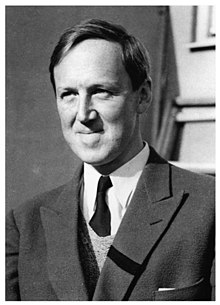Hannes Alfvén
Swedish electrical engineer, plasma physicist and science fiction author (1908–1995), winner of the 1970 Nobel Prize for Physics
(Redirected from Hannes Alfven)
Hannes Olof Gösta Alfvén (30 May 1908, Norrköping, Sweden – 2 April 1995, Djursholm, Sweden) was a Swedish electrical engineer, plasma physicist and winner of the 1970 Nobel Prize in Physics for his work on magnetohydrodynamics (MHD). He described the class of MHD waves now known as Alfvén waves. He was originally trained as an electrical power engineer and later moved to research and teaching in the fields of plasma physics and electrical engineering. Alfvén made many contributions to plasma physics, including theories describing the behavior of aurorae, the Van Allen radiation belts, the effect of magnetic storms on the Earth's magnetic field, the terrestrial magnetosphere, and the dynamics of plasmas in the Milky Way galaxy.

Quotes
editDean of the Plasma Dissidents (1988)
edit- Hannes Alfvén as quoted by Anthony L. Peratt, Dean of the Plasma Dissidents in "The World and I" (supplement to the Washington Times, May 1988)
- We should remember that there was once a discipline called natural philosophy. Unfortunately, this discipline seems not to exist today. It has been renamed science, but science of today is in danger of losing much of the natural philosophy aspect.
- p. 192.
- Scientists tend to resist interdisciplinary inquiries into their own territory. In many instances, such parochialism is founded on the fear that intrusion from other disciplines would compete unfairly for limited financial resources and thus diminish their own opportunity for research.
- p. 192.
- I have never thought that you could obtain the extremely clumpy, heterogeneous universe we have today, strongly affected by plasma processes, from the smooth, homogeneous one of the Big Bang, dominated by gravitation.
- p. 196.
- There is no rational reason to doubt that the universe has existed indefinitely, for an infinite time. It is only myth that attempts to say how the universe came to be, either four thousand or twenty billion years ago.
- p. 196.
- Since religion intrinsically rejects empirical methods, there should never be any attempt to reconcile scientific theories with religion. An infinitely old universe, always evolving, may not be compatible with the Book of Genesis. However, religions such as Buddhism get along without having any explicit creation mythology and are in no way contradicted by a universe without a beginning or end. Creatio ex nihilo, even as religious doctrine, only dates to around AD 200. The key is not to confuse myth and empirical results, or religion and science.
- p. 196.
- Most people today still believe, perhaps unconsciously, in the heliocentric universe ... every newspaper in the land has a section on astrology, yet few have anything at all on astronomy.
- p. 196.
- I have no trouble publishing in Soviet astrophysical journals, but my work is unacceptable to the American astrophysical journals.
- p. 197.
- The peer review system is satisfactory during quiescent times, but not during a revolution in a discipline such as astrophysics, when the establishment seeks to preserve the status quo.
- p. 197.
- Students using astrophysical textbooks remain essentially ignorant of even the existence of plasma concepts, despite the fact that some of them have been known for half a century. The conclusion is that astrophysics is too important to be left in the hands of astrophysicists who have gotten their main knowledge from these textbooks. Earthbound and space telescope data must be treated by scientists who are familiar with laboratory and magnetospheric physics and circuit theory, and of course with modern plasma theory.
- p. 197.
Quotes about Alfvén
edit- During Alfvén's visit he gave a lecture at the University of Chicago, which was attended by Enrico Fermi. As Alfvén described his work, Fermi nodded his head and said, 'Of course.' The next day the entire world of physics said. 'Oh. of course.'
- Alex Dessler, editor Geophysical Research Letters, in: The World & I Vol. 3, Nr 5-6 (1988), p. 195
- When I entered the field of space physics in 1956, I recall that I fell in with the crowd believing, for example, that electric fields could not exist in the highly conducting plasma of space. It was three years later that I was shamed by S. Chandrasekhar into investigating Alfvén's work objectively. My degree of shock and surprise in finding Alfvén right and his critics wrong can hardly be described. I learned that a cosmic ray acceleration mechanism basically identical to the famous mechanism suggested by Fermi in 1949 had [previously] been put forth by Alfvén.
- Alex Dessler in: The World & I Vol. 3, Nr 5-6 (1988), p. 195